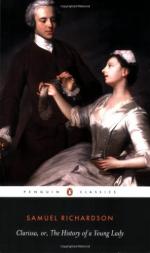LETTER XXV
Mr. Lovelace, to John Belford, Esq.
I thought it was now high time to turn my whole mind to my beloved; who had had full leisure to weigh the contents of the letters I had left with her.
I therefore requested Mrs. Moore to step in, and desire to know whether she would be pleased to admit me to attend her in her apartment, on occasion of the letters I had left with her; or whether she would favour me with her company in the dining-room?
Mrs. Moore desired Miss Rawlins to accompany her in to the lady. They tapped at the door, and were both admitted.
I cannot but stop here for one minute to remark, though against myself, upon that security which innocence gives, that nevertheless had better have in it a greater mixture of the serpent with the dove. For here, heedless of all I could say behind her back, because she was satisfied with her own worthiness, she permitted me to go on with my own story, without interruption, to persons as great strangers to her as me; and who, as strangers to both, might be supposed to lean to the side most injured; and that, as I managed it, was to mine. A dear, silly soul, thought I, at the time, to depend upon the goodness of her own heart, when the heart cannot be seen into but by its actions; and she, to appearance, a runaway, an eloper, from a tender, a most indulgent husband!—To neglect to cultivate the opinion of individuals, when the whole world is governed by appearance!
Yet what can be expected of an angel under twenty?—She has a world of knowledge:—knowledge speculative, as I may say, but no experience.—How should she?—Knowledge by theory only is a vague, uncertain light: a Will o’ the Wisp, which as often misleads the doubting mind, as puts it right.
There are many things in the world, could a moralizer say, that would afford inexpressible pleasure to a reflecting mind, were it not for the mixture they come to us with. To be graver still, I have seen parents, [perhaps my own did so,] who delighted in those very qualities in their children while young, the natural consequences of which, (too much indulged and encouraged,) made them, as they grew up, the plague of their hearts.—To bring this home to my present purpose, I must tell thee, that I adore this charming creature for her vigilant prudence; but yet I would not, methinks, wish her, by virtue of that prudence, which is, however, necessary to carry her above the devices of all the rest of the world, to be too wise for mine.
My revenge, my sworn revenge, is, nevertheless, (adore her as I will,) uppermost in my heart.—Miss Howe says that my love is a Herodian love.* By my soul, that girl’s a witch! I am half sorry to say, that I find a pleasure in playing the tyrant over what I love. Call it an ungenerous pleasure, if thou wilt: softer hearts than mine know it. The women, to a woman, know it, and show it too, whenever they are trusted with power. And why should it be thought strange, that I, who love them so dearly, and study them so much, should catch the infection of them?




